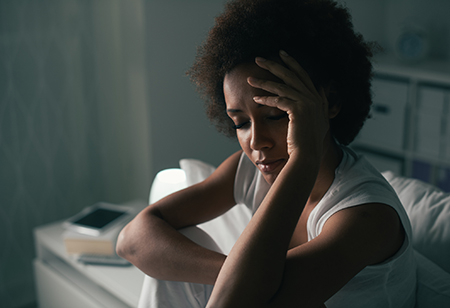
Some migraine headaches can be so intense that they bring with them symptoms mimicking a stroke. And while it can be unnerving to experience any of these symptoms, the good news is that it's unlikely any of them will affect a migraine sufferer for very long. That's because it's extremely rare for a stroke to occur as a result of a migraine headache.
Both migraine and stroke are neurovascular disorders, explained Jan Bland, RN, an independent member of the HonorHealth Medical Staff. "They have similar causes, including what we call vascular insufficiency — not enough blood flow to an area."
However, she said, "There are no strong indicators that suggest a direct link between migraine headache alone and stroke."
One type of migraine may produce stroke-like symptoms
Three migraine types affect the vast majority of sufferers — classic migraine; migraine with aura (visual disturbances such as spots, zigzag lines or a kaleidoscope effect in front of the eyes); and hemiplegic migraine, which is felt on one side of the head only.
It's believed hemiplegic migraine has more of a connection to blood flow, Jan said. "Though hemiplegic migraine is very rare – less than 1% of all migraines – it can result in symptoms of weakness on one side of the body, tiredness, slurred speech and numbness, tingling and pain in the limbs, sometimes for hours or even days."
Bland said hemiplegic migraines can happen randomly, especially when you have a history of migraine with aura. Hemiplegic migraine "can be what's known as sporadic or it can be familial," she said, "so you may be more likely to experience a hemiplegic migraine if members of your family have suffered from this type."
When someone comes into a hospital emergency department complaining of migraine and other symptoms, including weakness on one side of the body, numbness, tingling and/or slurred speech, a CT scan may be ordered to rule out a stroke, Jan said. Doctors are more concerned about a possible stroke in patients over 40 with other risk factors, she said, including high blood pressure, diabetes, high cholesterol, current use of oral contraceptives, obesity and current or former tobacco use.
Migraine and stroke may be linked when other factors are present, said Jan. She points to the American Headache Society's systematic review of estrogen use and tobacco in women who experience migraines. The society concluded that women who suffer from migraines, smoke tobacco and take estrogen-based oral contraceptives over age 35 may have an increased risk of stroke. The recommendation for women over 35 who do have migraines but want to remain on oral contraceptives is to start relying on a lower-dose estrogen birth control pill until their early 50s and avoid other stroke risk factors such as tobacco use, Jan said.
Keep this in mind...
Most migraine headaches don't lead to stroke. But there are a number of alarming symptoms that can occur along with a migraine (weakness on one side of the body, tiredness, numbness, tingling and slurred speech) that should be ruled out as signs of a stroke, especially if you have other risk factors. "Definitely go to your doctor or an emergency department if you're having a migraine and also experiencing these symptoms," Jan said.